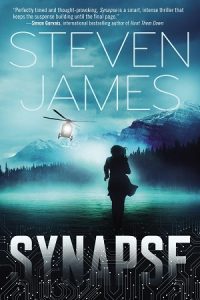The “outside observer” character has populated a lot of SF stories over the years. How does Jordan fit this pattern?
 What an insightful question! In this story Jordan has made a moral decision that he deeply regrets. When he seeks forgiveness for it he isn’t sure where to turn. His unique perspective on human nature informs Kestrel and helps her to see life from a different vantage point.
What an insightful question! In this story Jordan has made a moral decision that he deeply regrets. When he seeks forgiveness for it he isn’t sure where to turn. His unique perspective on human nature informs Kestrel and helps her to see life from a different vantage point.
Given the near-future technology in Synapse, what kind of research or influences went into this novel?
I had to do tons of research on AI and futurism. It was fascinating to try to guess what society will be like thirty years in the future. Will people still use mobile phones? What will society look like? How will the growing human population affect people’s lives? Looking at current technological trends helped me tremendously in anticipating what life will be like three decades from now.
When you’re world-building like this, what are the challenges to making it fantastical yet still grounded?
In order to ground people in the story I started the book with a very human experience when Kestrel gives birth to her daughter. Rather than trying to transport people to another world, I wanted to root them in this one. From there, I slowly introduced the differences between Kestrel’s world and our own. Yes, the future will be different, but human nature will remain the same.
Click thru to discover the spiritual themes driving the novel…


